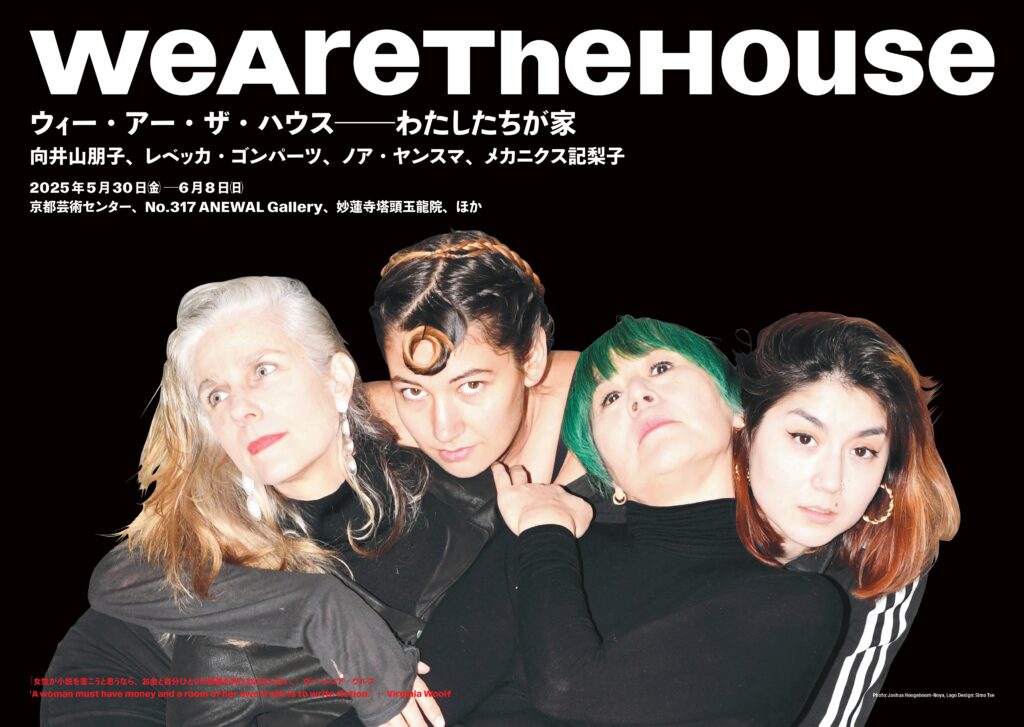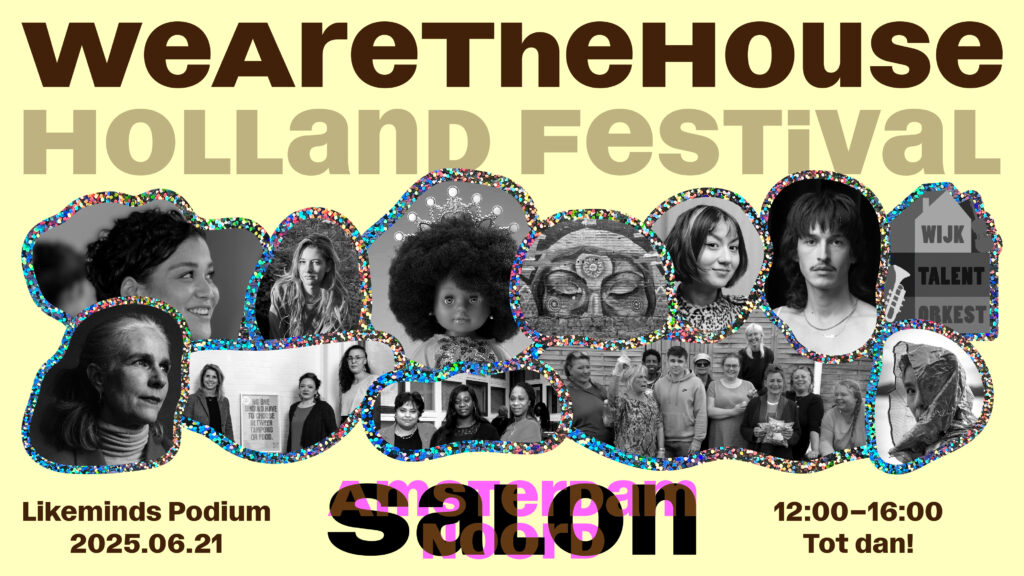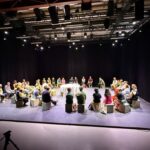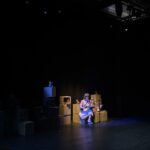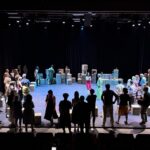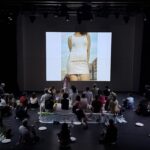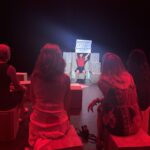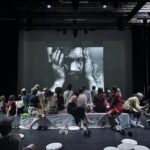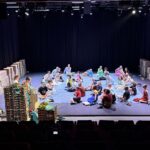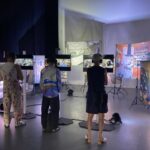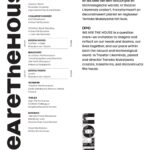WE ARE THE HOUSE: Salon
Titled intriguingly ‘We Are the House’, this project brings together three Dutch artists and activists, along with myself, for a 9-day salon in Kyoto where we create a HOUSE through dialogue with the local community. This salon takes place across theatres, cinemas, galleries, schools, and temples, ultimately leading to a performance piece premiering in 2026.
Through exhibitions, performances, talks, film screenings, workshops, parties, and shared meals, we aim to create an open and inclusive space where artists and citizens can connect and engage in dialogue. Key themes such as femininity, family, gender inequality, patriarchy, LGBTQ rights, human rights, and abortion care will be at the forefront of our discussions.
Traditionally, a house is viewed as a shelter from the elements — a place of comfort within the family and community. However, can we observe, shift, liberate, dismantle, share, and co-create the concept of HOUSE, transforming it into a space that belongs to us all? We confront this question together over these nine days of experimental dialogue.
< Program >
■ Making Our Altar
During the salon, we created a shared altar where participants were invited to place photographs, cherished keepsakes, favorite flowers, or fruits. Everyone brought something meaningful, and together we completed this collective altar filled with thoughts and memories.
■ BIG HOUSE PARTY
Kansai’s most iconic drag queens came together for a glamorous and powerful opening party! Joined by pole dancers, go-go boys, voguing dancers, and more, the dazzling show featured 23 incredible performers.
Performers: Simone Fukayuki, Bluerett, OZ, Femminina, Afreeda O Breat, Chocolate de Chocolate, BeBe marmalade/SHINTAROH, TAIYO, MAL /ELIANA, MECAV /ShowTA, Tenchan, chihaya, Mokkyun / Yuki & Kei, inesik / D・K・Uraji /DJ kor, DJ Shunpuri
■ Makeover for Me
Participants experienced party makeup, face painting, and manicures by drag queens, embracing the freedom of expression beyond gender boundaries. This joyful and transformative experience helped many discover new possibilities for their own unique expression of gender.
■ Culinary Explorations / Intergenerational Cooking Show by Noa Jansma + Kiriko Mechanicus
This art project uncovered the stories woven into the family kitchen. It explored how family histories and daily rituals are passed down, offering a fresh perspective on domestic spaces. The event evoked a “family restaurant” atmosphere, embodying the transmission of tradition across generations.
■ School of Sex and Women’s Bodies with Rebecca Gomperts
Understanding our bodies is the foundation of sex education and the first step toward freedom. This school offered a space to learn about anatomy, sexuality, health, and rights, deepening understanding through open discussion.
#1 Science and Fantasy
#2 Our Bodies
#3 Lecture Performance: Contraception and Abortion – The Past 200 Years
■ Japanese Language Class
This class examined how Japanese family titles—such as 主人 (master), 嫁, 奥さん, and 家内 (all meaning wife)—reflect patriarchal norms. Centered around residents of Horikawa Danchi, the discussion explored how we address one another in daily life and proposed alternative expressions aligned with individual values.
■ Queer Film Screening & Discussion with Yuka Kanno
Curated by queer studies researcher Yuka Kanno, this screening showcased films exploring the diversity of gender and sexuality. An open discussion followed, encouraging participants to share thoughts, raise questions, and engage in dialogue.
■ En Shokudo (Soup Kitchen for Children)
Led by Teruumi Nakamichi (head priest of Gyokuryu-in Temple) and agricultural history researcher Tatsushi Fujiwara, this child-friendly soup kitchen promoted the idea of en-shoku—gentle, inclusive “connected dining.” It created a warm moment where children and adults came together to share food and community.
■ Otohime Radio
Mai Endo and Tomoko Mukaiyama reimagined Otohime—a Japanese sound-masking device for restrooms—as a media installation offering multilingual practical information. Presented in the restrooms of Kyoto Art Center, the work challenged the culture of silencing bodily sounds and highlighted global toilet cultures, inviting audiences to rethink norms around restroom etiquette.
Credits
Artist/ Activist: Tomoko Mukaiyama, Rebecca Gomperts, Noa Jansma, Kiriko Mechanicus
Collaborators: Afreeda O Breat (Art Manager / Drag Queen), Mai Endo (Artist), Yuka Kanno (Professor at Doshisha University, Film Studies), Simone Fukayuki (Chanson Singer / Drag Queen), Joyce Lam (Artist, Editor), Terumi Nakamichi (Chief Priest, Gyokuryu-in Temple, Myoren-ji), Tatsushi Fujiwara (Professor at the Institute for Research in Humanities, Kyoto University; Agricultural Historian), Natsumi Mitsuhashi (Junior High School Teacher, City of Kyoto)
Production: Tomoko Mukaiyama Foundation
Co-production: Kyoto Art Center, Nieuwe Instituut, Holland Festival
Endorsement: Embassy of the Kingdom of the Netherlands in Japan, DutchCulture, Culture All Nippon (CAN), Multus
In cooperation with: City of Kyoto, NPO ANEWAL Gallery, Gyokuryu-in Temple (Myoren-ji), knocks! horikawa, Karafuru Children’s Cafeteria
Supported by: Embassy of the Kingdom of the Netherlands in Japan, DutchCulture, Fonds Podiumkunsten, Amsterdams Fonds voor de Kunst, Agency for Cultural Affairs, Government of Japan, through the Japan Arts Council, as part of the Subsidy for Regional Core Performing Arts Theaters and Music Halls; Commemorative Fund for the Japan World Exposition 1970
Sponsorship: Alpha Blanca Co., Ltd.
WE ARE THE HOUSE: Salon Kyoto
30 May- 8 June 2025 Kyoto Art Center, ANEWAL Gallery, Gyokuryu-in Temple, Kyoto (JP)
Holland Festival @ Likeminds
Visitors are invited to step inside this ever-evolving house. Throughout the day, short interventions take place in various “rooms,” with the audience actively reshaping the space—transforming a living room into a bedroom, a bedroom into a kitchen, and so on. The house remains in continuous transformation for four hours.
In the salons, artists and experts lead performances, a tea ceremony, and discussions. Participants include doctor and activist Rebecca Gomperts, artist Noa Jansma, and filmmaker Kiriko Mechanicus. Alongside these (inter)national voices, local initiatives from Amsterdam-Noord help shape the house. They form the backbone of society and help turn this neighborhood into a home.
Credit
Concept: Tomoko Mukaiyama
Performance: Tomoko Mukaiyama, Rebecca Gomperts, Kiriko Mechanicus, Noordse Vrouwen represented by Bishrel Bolor, Colourful goodies, Just van Bommel, Moeders van Noord, Darío Sendoya & Mónica Urbina from Casa B, Clotilde Paillaugue from Neighborhood Feminists, Merel van Looi, Helen’s Free Food Market
Video installation: Noa Jansma, Kiriko Mechanicus
Figurante: Just van Bommel, Ting Gong, Kiriko Mechanicus, Matthew Oxley, Yuji Tsutsumida
Production Leader: Willem Schenk
International Producer: Naomi Russell
Production Manager: Ascha Prins
Production Assistant: Yayoi Manabe
Graphic Design: Simpson Tse
Concept Editor: Jannie Pranger
Business Manager: Britt Verstegen
Production: Tomoko Mukaiyama Foundation
Co-production: Holland Festival, Kyoto Art Center, Nieuwe Instituut
Support by: Fonds Podiumkunsten, Amsterdams Fonds voor de Kunst, Dutch Culture, the Dutch Embassy in Japan
WE ARE THE HOUSE: Salon Holland Festival
21 June 2025 Likeminds, Amsterdam
